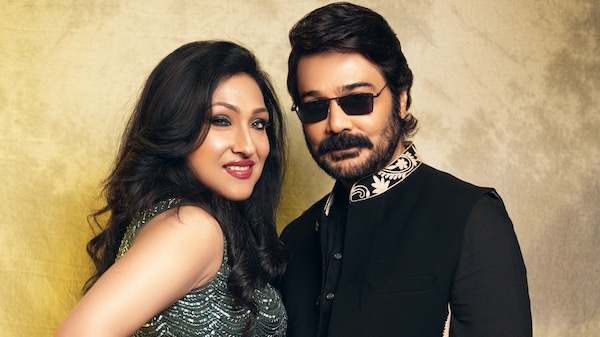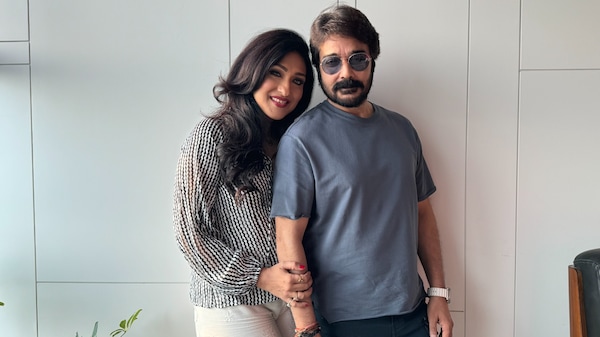Exclusive! Ajogyo stars Prosenjit Chatterjee and Rituparna Sengupta share the secret of their sizzling chemistry
Ajogyo delves into the relationship saga between the characters played by Rituparna Sengupta, Prosenjit Chatterjee, and Silajit Majumder.

Last Updated: 10.20 PM, Jun 04, 2024
Prosenjit Chatterjee and Rituparna Sengupta are all set with their 50th film, Ajogyo. Directed by Kaushik Ganguly, the film will hit the theatre on June 7. Ajogyo delves into the relationship saga between the characters played by Rituparna, Prosenjit, and Silajit Majumder. The film also features Lily Chakraborty, Ambarish Bhattacharya, and others.
The promotional trailer of Ajogyo emphasised the ‘magic’ of ‘Prosenjit and Rituparna juti (pair)’. In 1994, The duo started their journey with Nagpanchami. After numerous blockbuster hits, the duo took a break of 14 years and finally got back in 2016 in Shiboprosad Mukherjee and Nandita Roy’s Praktan. The film proved that the magical chemistry between the actor and actress remained intact despite the break.
Prosenjit Chatterjee and Rutuparna Sengupta’s secret recipe for sizzling chemistry
What is the ‘secret’ behind this chemistry? In a candid chat with OTTplay, Rituparna and Prosenjit talked about the recipe for their success and how the gap of 14 years helped them grow.
Rituparna said that the secret behind a successful pair lies in a blend of interpersonal chemistry and professional commitment. “There is some kind of chemistry that works in favour of a hit pair. I don’t know what exactly it is. But there is some kind of energetic field that gets created. It is not deliberate but that does get created. Since our first film, we used to get that kind of attraction from people. Technicians noticed that spark, and as a result, directors and producers noticed it too,” she said.”
The actress further added that they took no time to become an economically viable pair in the Bengali film industry. Rituparna said, “Over the years, this frenzy got created. That’s because our films have become very successful. The directors and producers thought we were dependable pairs on whom they could invest their money. That helped us to grow. I heard producers calling us ‘Lakshmi pair’. We used to sign films in a row. Directors and producers used to squabble to sign us in their films. And all these used to happen because they could bank on us. They knew they would be able to get the return on their investment if we were in.”
On the other hand, Prosenjit said that they took responsibility to make their films work. Besides their acting and character formations, they used to take care of their styles, costumes, makeup, songs, choreography, and so on. “I agree with Ritu. The kind of responsibility we used to take was enormous. Individually, I, as an actor, used to take responsibility. Even as a pair, we were not just an actor and an actress. We used to take responsibility for the films. It is not just the producers or directors but the audiences used to bank on us too. Otherwise, our films would not have run for weeks. Every time we used to make it our job to make our pair work better among our audience. We used to put extra effort in terms of our skills, character, look, costume, and so on. We did not have that support system like today. We did not have stylists and all. We used to work on those things. We used to think about how to make each song special. We used our efforts and inputs. That made our pair work.”

Both of them admitted, they honed their ‘never-say-die’ attitude throughout their career. Prosenjit said, “Be it Sasurbari Zindabad or Praktan and Drishtikone – Ritu and I never gave up. We treated each of our films as the first film. Be it Kaushik Ganguly, Shibu-Nanditadi (Shiboprosad Mukherjee and Nandita Roy), and whoever we worked with we worked as their first students. That’s why we could break ourselves and create new characters.”
Both Rituparna and Prosenjit are proud of the success of this pair. “We sustained for so many years. How many pairs do we know that could run for so long? Asked Rituparna. Prosenjit said, “That is the history, you know. Not that we worked in 50 films but we sustained for so many years… We are proud of this pair, yes. But it is a pride even for the industry we work in. It is an achievement for Bengali cinema that it has let us work on 50 films. It is a celebration for our audience…”
Also read: Prosenjit Chatterjee and Rituparna Sengupta’s Ajogyo will delve into jobloss and its aftermath
While Ajogyo is their 50th film, they could have touched the mark years ago. Is there any regret of not working together for 14 years together? Prosenjit clearly elaborated on how these 14 years helped him diversify his career. “If you see the way I handled my career – with or without Ritu – every step for me was predetermined. It was a conscious decision that I would leave the path of a certain style of film and start working on other genres of films. I felt that the next generation should take over the space of so-called ‘commercial’ films after me. Ritu also started doing films like Muktodhara and all. Cinema was also evolving. This gap of 14 years increased our longevity in the industry. Somewhere, somebody blessed us and said, “Enough! You two needn’t work together for a few years.”
Rituparna agreed with him. She said, “We grew individually during these years. That was destiny. It was not a conscious call for me. Circumstances were such that we did not work together. That shaped our respective careers. I worked with a number of new directors and producers. Also, a space for newer directors was created in the industry during that time.”
Along with Rituparno Ghosh and even later with directors like Nandita Roy, Shiboprosad Mukherjee, and Srijit Mukherjee, Rituparna and Prosenjit worked thoroughly through the changing phase of Bengali cinema in 2000. “Pro: Ritu presented Shiboprosad Mukherjee and Nandita Roy’s Icche and I did Srijit Mukherji’s Autograph,” recalled Prosenjot, to which, Rituparna added, “I did Muktodhara and Alik Sukh with Shibu and Nandita that time. He did a lot of films. He worked with Rituda (Ritruparno Ghosh). The last film I did with Rituda was Utsav. Rituda wanted me to do Dosar and Chokher Bali. However, that did not work out.”
The changing benchmark of ‘hit’ films
Prosenjit and Rituparna also spoke about the changing business model of the Bengali industry. In the ’90s and even early 2000s, a hit film used to run for weeks before it was declared a hit. In today's time, a film’s fate largely depends on the first weekend’s business. Talking about it, Prosenjit said, “The entire business pattern has changed. The way the films used to get released, the way there used to be just three shows per day, the distribution and exhibition, everything has changed. Due to the entry of multiplexes, the collection pattern has changed. These days, a film needs to work within a week or two.”
The actor further recalled the ‘industry lingo’ of that time. “We used to identify films as ‘long run movies’. This means the film might not have started with a bang but after a few days, those films used to give all houseful shows. Once they started working, they used to run for weeks. The theatre owners used to keep those films intact. There was one more term: ‘Ladies Chhobi’ – or a film that was largely lauded by women viewers. Earlier, there used to be a ‘ladies stall’ in the theatres. We used to ask the exhibitors if those ‘Ladies Stalls’ were garnering audiences. If ‘Ladies Stalls’ started getting full, then nothing could stop those films from being superhit.”
Taking a cue from there, Rituparna said, “Women used to be the matinee audience and if a film can work in the matinee show, that film would work in any show.”
Prosenjit added, “Things are very different these days. These lingos make no sense anymore. Shibu and Nanditadi got those audiences back to the theatres. Kaushik also. If today a film does good business in 50 days, people should be happy about it.”
Finally, Rituparna pointed out that even today, it is the family-loved films that work at the box office better than any other film. “One thing has not changed. If a film can be enjoyed by the whole family, that film is a hit. An entire family will involve around 6 to eight people. They uphold the sense of community watching.” Prosenjit agreed to the point and said, “Families are the main viewers. We always felt that if grandfathers and grandsons watch a film together it will be a hit film.”
Subscribe to our newsletter for top content, delivered fast.

